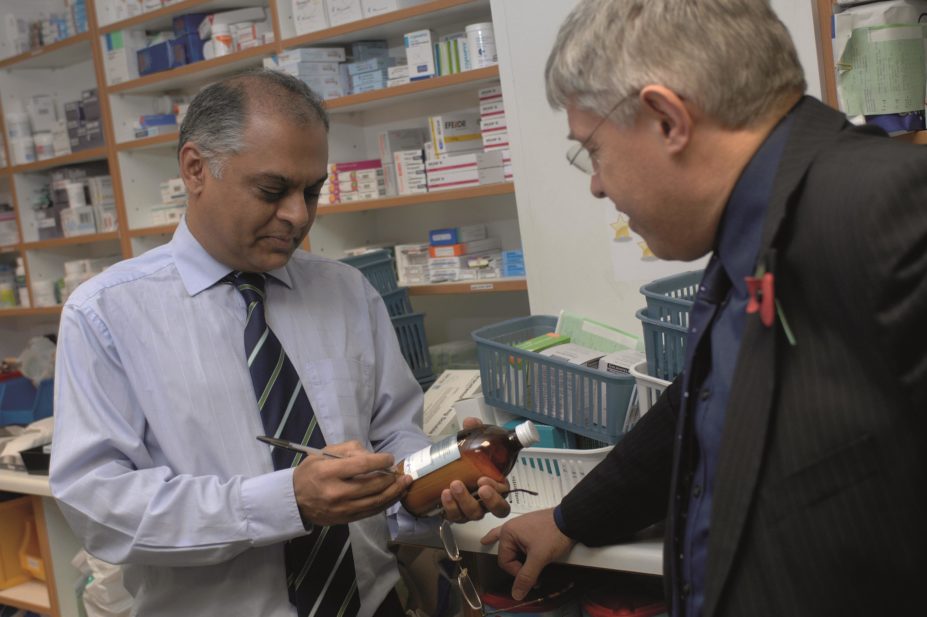
67photo / Alamy
Proposals that include aligning financial incentives in the contracts of community pharmacies and general practices to encourage more joint working have been published for consultation by the Royal Pharmaceutical Society (RPS) and the National Association of Primary Care (NAPC).
The joint proposals call for better
integration of the care provided by community pharmacists and GPs in areas such as lon
g-term conditions,
public health and the prevention of illness. They also urge the alignment of contract negotiations and a greater role for community pharmacists in managing minor ailments.
The RPS and NAPC say the proposals would represent a profound change for community pharmacies but that growing dem
ands on primary car
e access mean new ways of working are needed that are based on greater collaboration on local pathways of care.
The
co
nsultation document
,
‘Improving patient care through better general practice and community pharmacy integration’
, invites stakeholders from pharmacy, general practice, the wider NHS and patients to comment.
The proposals include the development of “an underlying approach that binds the contractual frameworks of community pharmacies and general practices together: the need for a new Joint Population Health Framework”. This framework would pay GPs, community pharmacists and other providers to work together to deliver defined care outcomes.
The organisations say this would be a “radical shift” away from the existing payment mechanism for community pharmacies, which is based on drug purchasing, dispensing and service provision. “Moving to a Joint Population Health Framework that rewards community pharmacy for its role in holistic patient care is a huge challenge, but we believe aligning financial incentives with improved population health will enable community pharmacy to play a fuller role in health provision,” the organisations say.
As an example, patie
nts with long-term conditions could be identified by any one of a number of providers, including local pharmacies, and their ongoing support could be provided jointly by GPs and community phar
macists. This wo
uld incentivise local healthcare professionals to organise services to best suit local patie
nts’ needs, they say.
Aligned contract talks urged
The consultation document also sets out a range of measures to improve collaborative working, including: making community pharmacies the first port of call for minor, self-limiting conditions; GPs and community pharmacists managing high-risk patients jointly; pharmacists working within GP surgeries; and giving community pharmacists read/write access to patient records.
The organisations call on NHS England to make clear “the intention to drive the closer working and integration of pharmacy and general practice” by aligning contractual negotiations each year.
“For too long community p
harmacy has been straightjacketed with a top-down contract that doesn’t allow practitioners like me to redesign our local services in line with the population’s needs,” says Ash Soni, RPS president and NAPC board member.
“It’s time to end the one-size-fits-all approach and allow services to be designed around the needs o
f patients and the public rather than healthcare providers.”
Soni says the pharmacy profession can either be part of the NHS’s drive for new models of care or “risk being marginalised”. “More importantly the NHS will miss an opportunity to repurpose resources that lead to better healthcare services to the public,” he adds.
Opportunities for collaboration
Nav Chana, NAPC chair, says: “It’s encouraging that the focus on greater collaboration between community pharmacy and general practice has been recognised.
“The opportunities for greater collaboration could have a big impact on the workload pressure for general practice and hence the importance of this consultation at this time.”
Sandra Gidley, chair of the English Pharmacy Board of the RPS, says: “If we are to move away from the treadmill of dispensing to a role where our clinical skills are recognised and valued by the public, then the payment structures we currently work under will need to change. These proposals are designed to test the appetite for that; do we want to stay as we are or do we want a different role in the reformed NHS? Now it’s over to GPs, pharmacists and users of NHS services to let us know what you think.”
Responses to the consultation will form the basis of a report on integrated working between GPs and pharmacists and new policies for the two organisations, which they will use to stimulate debate.
The Pharmaceutical Services Negotiating Committee, the British Medical Association and NHS Employers would need to agree any contractual changes before they could be introduced.
The consultation closes on 9 October 2015. The consultation documents and the form to respond with can be found on the RPS website.
You may also be interested in
Long service of members

Membership fees 2022
